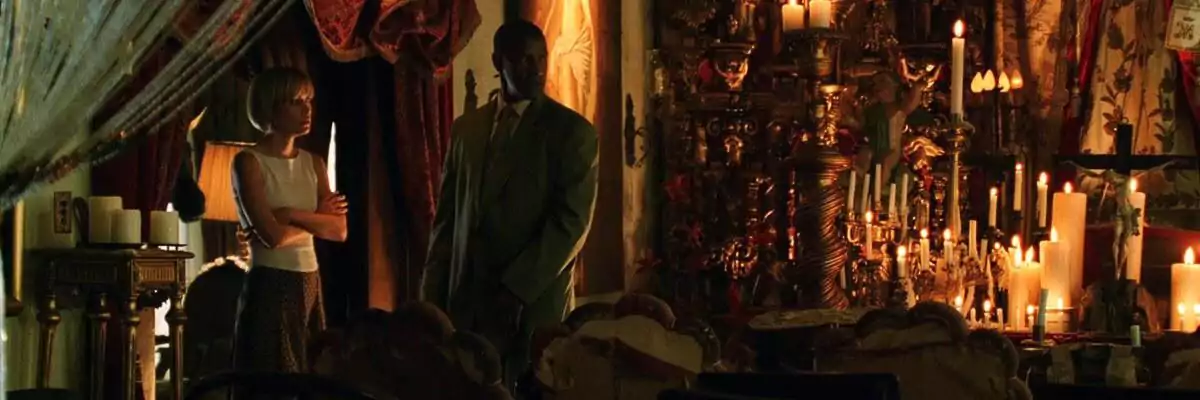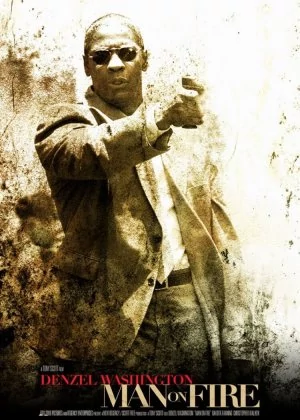Man on Fire
Tony Scott peaked with Domino, but the foundations of that film were laid in Man on Fire. The two films form a perfect double bill, though not for the faint of heart. Man of Fire is a raging action movie, a fast-paced visual assault that tests the boundaries of the acceptable. At least, that's how I experienced Man on Fire the first time around. That was more than 10 years ago though and so I was curious to see how Man on Fire held up after all this time. Just like Domino a couple of weeks earlier, Scott's little gem didn't disappoint.

Man of Fire is a film that still comes off as fresh and modern, though that's not just Scott's doing. The fact that almost nobody bothered to copy his peculiar stylistic approach is one of the main reasons this film has preserved rather well. Scott borrowed and expanded on the cinematic language of movie trailers and went on to build an entire movie out of that. While it earned Man of Fire plenty of novelty credits, it's clear that your average movie audience prefers a well-rounded narrative and proper, decent storytelling. Present company excluded of course.
Man of Fire is an adaptation of A.J. Quinnell's novel and follows a (rather obscure) late 80s adaptation of the same book. Scott moved the setting from Italy to Mexico (City) and mixed in some real-life Mexican cases to make the film a bit more topical. While the film hardly qualifies as socially relevant and/or important, there is a definite message here that Scott pushes through as much as he can. In the end though Man of Fire is very much an action/thriller that works best on a visceral level.
The film follows John Creasy, a former CIA operative who finds himself in Mexico, visiting one of his old pals. Creasy lacks a clear goal in life and his friend recommends taking on a job as a security guard in Mexico City, where kidnappers are running rampant. Creasy lands himself a job protecting Pita, a young American-Mexican girl who sees Creasy more as a friend than a bodyguard. It doesn't take long before Pita becomes the target of a lucrative kidnapping, what Creasy doesn't know is that the kidnapping is just the tip of the iceberg.

If you've seen Domino, you pretty much know what to expect. If not, watch a random Michael Bay trailer, quadruple that and imagine it smeared out over an entire film. There's an excess of color filters, edgey camera work and crazy camera angles, but the truly defining part of the visuals is the editing. Every scenes looks like it was fully deconstructed and put together again by someone with ADHD. For a film that relies on adrenaline and tension, that's not a bad thing though. Scott defended his approach by saying it reflects the mental stability of Creasy's character, but if you're sensitive to visual impulses that explanation isn't going to save the film for you. That said, I absolutely loved it.
The soundtrack isn't quite as crazy but the synchronicity with the images is remarkable and definitely adds to the overall atmosphere. The music itself is edgey enough, not too insane to scare people away but still well above the generic film score level. When there's a discotheque scene that is accompagnied by some actual, believable real-world dance music, you can tell that an above average amount of effort went into the soundtrack. Don't set your expectations too high, but Scott did well here.
Tony Scott counts on regular Denzel Washington to bring his lead character to life. Washington does what he does best and delivers an introverted but powerful performance. The contrast with the young Dakota Fanning couldn't be bigger, but that in part is the appeal of the lead duo. The secondary cast is good too, though a little expendable, except for Christopher Walken. His part isn't all that big, but he makes quite the impression in a very short span of time.

The second half of Man on Fire is mixing detective, revenge and thriller elements in order to make everything appear a little grittier. The film remains well within the boundaries of the expected, but there are some pretty brutal scenes, with very few cop-outs on Scott's side. Creasy's descent into the Mexican underground is not the most pleasant thing to watch, but his almost superman-like powers keep the film firmly grounded into action film territory. In the end, the entertainment value overshadows whatever message Scott was trying to push through, but seeing as subtlety isn't Hollywood's strong point, that's probably not a bad thing.
If you're looking for a traditional action flick or you're one of those people who loves to complain about the MTV aethetic of modern cinema, leave this film alone. Man on Fire is a film with very few stylistic compromises. Together with Domino it marks the highlight of Scott's career, an influence I feel is dearly missed in modern-day Hollywood. It's definitely not for everybody, but a little love/hate rhetoric never hurt the long-term survival chances of a film. If you like your action cinema over the top, make sure to give this one a try.
